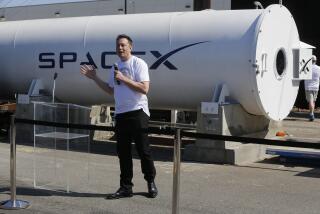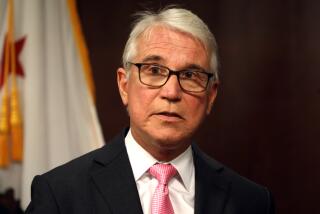Trade Secret Suits Keep Canadians From Jobs in U.S.
It was only a job opportunity, says Albert DesRoches, a chance to make more money and move from chilly Canada to sunny Southern California. But it turned into a nightmare.
DesRoches has been unemployed for six months since a court prohibited him from accepting the new job, and he’s facing criminal charges in Quebec for allegedly stealing documents from his former employer--something he denies.
The situation is considered unusual by labor law experts because it involves a prohibition against going to work for a competing firm. “I’ve never heard of a case where someone sought to enjoin the employer from hiring” a competitor’s employee who is not under an employment contract, said Benjamin Aaron, a UCLA labor law professor.
Late last year, Plant Equipment, based in Temecula in Riverside County, offered to hire DesRoches and five other employees affiliated with Montreal-based Positron Inc. They had the experience needed to help his company rapidly develop and sell a line of equipment that traces calls made on 911 emergency telephone lines, Plant Equipment President John Fuller says.
But Positron President Reginald Weiser claims that it was an illegal plot to transfer Positron’s trade secrets to Plant Equipment.
Positron filed civil suits in Montreal and in U.S. District Court in Southern California, alleging that Plant Equipment and the six employees conspired to steal trade secrets relating to Positron’s 911 emergency technology, and--in a rare ruling--a U.S. District Court judge in Santa Ana in March prohibited Plant Equipment from hiring DesRoches and the others pending a trial.
Plant Equipment’s lawyer has asked the judge to reconsider that injunction, thus extending the legal debate over where to draw the line between a person’s right to work and a company’s right to protect itself against loss of its trade secrets. The request will be heard by U.S. District Judge Alicemarie Stotler on June 20.
To draw that line, Stotler must assess Plant Equipment’s intentions, the company’s counterclaim that Positron unfairly interfered in its hiring, an alleged “smoking gun” letter written by DesRoches and conflicting claims about the difficulties of technology development.
Meantime, DesRoches is preparing to defend himself in Canadian court on criminal theft charges connected with the alleged discovery of Positron documents at his Montreal home.
Questions surrounding the use of Positron material at DesRoches’ home are also central to Positron’s civil suit. DesRoches says he was doing work at home before he left the company. Positron says its discovery of the material at DesRoches’ home is evidence of an alleged conspiracy to steal its technology.
The technology in question is the specialized equipment for emergency telephone lines that allow a caller to be identified even if he or she cannot speak. When 911 is dialed, the telephone number and address of the caller is automatically displayed on a screen. Positron claims that the design of such equipment is one of its trade secrets.
Positron, which has sold such equipment to the Los Angeles Police Department among others, claims that the six former employees agreed to give Plant Equipment information about Positron’s technology in exchange for lucrative positions. The employees and Plant Equipment deny it.
Stotler issued a temporary injunction in January. Then, after a hearing weeks later, issued a permanent restraining order in April, pending trial.
In issuing her order in April, Stotler prohibited Plant Equipment from using any Positron trade secrets. She barred Plant Equipment from hiring the six men pending a trial of the case, noting that any effects of such an order would be less damaging than the potential damage to Positron.
Unusual Ruling
A legal “finding” prepared by Positron’s lawyer and approved by the judge states that if Plant Equipment were able to misappropriate Positron’s trade secrets and thereby enter the market, “it would usurp the opportunities . . . that rightfully belong to Positron.”
It adds that Plant Equipment would suffer little damage by not being able to hire the workers because the company “has not made great expenditures” in those efforts.
The ruling is unusual because most trade secrets cases involve situations that take place after employees have gone to work for competing firms.
Because Positron did not have DesRoches and the other defendants committed to employment contracts--the kind of pacts that prohibit certain employees from working for a competitor for certain periods--the ruling is particularly rare, according to Reginald Alleyne, who teaches labor and employment law at UCLA.
“It’s unusual to get an injunction where there is no contract,” Alleyne said.
As product manager at Positron, DesRoches sold 911 equipment and relayed customer suggestions to company engineers. His five colleagues were employed as engineers and technicians at Positron.
Plant Equipment’s conspiracy allegation is based partly on an alleged “smoking gun” letter dated last Dec. 7 from DesRoches to Plant Equipment’s Fuller. DesRoches had notified Positron of his plan to resign on Dec. 4, three days before the date of the letter. DesRoches has said he sought new employment because he felt underpaid. He solicited positions for five other Positron employees because they also wanted to leave Positron, he said.
Searched Executive’s House
The names and positions of the five men were noted in the letter, which was designed to attract job offers. The letter also contained a list of 911 emergency products that--according to DesRoches--the job applicants could develop for Plant Equipment. The proposition, DesRoches’ letter said, involved “an opportunity to enter an extremely lucrative . . . marketplace, without the usual front-end (research and development) costs.”
Positron’s Weiser called the letter “disgusting” evidence of a conspiracy. He said he discovered the letter on Dec. 10, when he went to DesRoches’ residence to recover missing confidential company information he believed that DesRoches possessed. Armed with a court order and accompanied by a bailiff, Weiser searched DesRoches’ house and found Positron documents, he said.
The letter to Plant Equipment was sandwiched between confidential Positron documents, including technical information and material on product pricing, Weiser alleged. As a result, he pressed criminal theft charges against DesRoches.
DesRoches insists that his Dec. 7 letter was an attempt to sell Plant Equipment on the group’s ability to quickly develop new 911 products--not a proposal to transfer trade secrets.
“I was doing a sales pitch,” he said. “Had I known it would be subjected to court scrutiny, I would have written it differently. . . . If I had planned to steal trade secrets, I wouldn’t note it in a letter and leave it lying around.”
Although DesRoches tendered his resignation on Dec. 4, he wasn’t expecting to depart until after a normal two-week notice period. He was still working for the company when Weiser and the bailiff came to his home looking for company documents, he said. He often took work home, DesRoches added.
Costly Legal Fees
“Even though I resigned,” DesRoches said, “Mr. Weiser asked me to complete half a dozen projects before I left. . . . He knew I had the material.”
He and the others have suffered financially, DesRoches said. Expecting to move, they sold their homes or relinquished their leases. Some wives and girlfriends quit their jobs, he said. Collectively, the six men owe $100,000 in legal fees, he said.
DesRoches is receiving unemployment insurance. So is another litigant, Ian McGraw, an engineer who supervised the four other ex-employees. McGraw said his family--a wife and 5-year-old daughter--will have to move in with his mother for financial reasons.
“We were so shocked and puzzled over why a judge would reach so strong a conclusion against us,” McGraw said.
Quebec Judge Andre Biron has also prohibited the six from giving some Positron designs and technology to Plant Equipment. However, he refused Positron’s request for an order barring them from working in the 911 industry. In denying such an order, he said Positron had not proved that it had a “secret formula, a secret process, a real trade secret.”
The Quebec judge also concluded that, during a Dec. 3 meeting in Montreal, McGraw and DesRoches had told Plant Equipment’s Fuller that they would design a controller different from Positron’s.
Positron is appealing the Quebec court’s decision, Weiser says. No trial dates have been set for the suits in either Canada or California.
Claims Protection
The Quebec court’s judgment was cited by Plant Equipment lawyer Douglas Law in papers filed in U.S. District Court earlier this month seeking to overturn Stotler’s ruling. In his filings, Law asks the court to reconsider the hiring injunction in light of the Quebec court’s decision not to bar the six from working in the industry.
Law also argues that the injunction on hiring should be lifted on the grounds Positron is protected from any trade secret theft by the provision of the federal court order prohibiting Plant Equipment from using confidential Positron information. Weiser said Positron’s lawyers will oppose that request.
“There are no grounds for ending the restraining order,” Weiser says. “They have not shown that they were willing to restrain themselves in the past, and there is no reason to believe they would do so in the future.”
Says DesRoches: “There was no wrongdoing on our part. What you’ve got here is irrational fear and innuendo. . . . There is only frustration that we gained experience at (Weiser’s) company and want to go somewhere else.”
More to Read
Inside the business of entertainment
The Wide Shot brings you news, analysis and insights on everything from streaming wars to production — and what it all means for the future.
You may occasionally receive promotional content from the Los Angeles Times.










